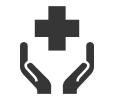In Canada, public mental health care consists of three types of care. Primary mental health care (first-line services) includes simple diagnostic procedures, basic treatment, and referral to more specialized services as needed. Secondary care is more specialized care that provides more extensive and complicated procedures and treatment; it may be provided within hospitals, clinics or office-based practices, on an inpatient or outpatient basis. Tertiary care is a set of specialized interventions delivered by highly trained professionals to help individuals with problems that are particularly complex and difficult to treat in primary or secondary settings.
People that are homeless and have a mental illness require many diverse services and supports but few homeless people can successfully access and benefit solely from the public mental health care. Being homeless makes it difficult or impossible to access general health care services. The homeless are unable to: obtain medical treatment without a health card (applicants requires an address); pay for items not covered by provincial medical or drug insurance plans; receive adequate treatment in cases where their personal appearance alarms health providers; make a health appointment (lack of an address and telephone); and receive coordinated care when comprehensive medical records are not kept in one location with one provider.
For further information, please see our blog post on how we can improve healthcare access for those experiencing homelessness.


